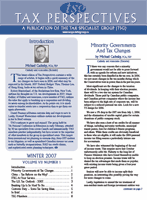
PDF Format
 Issue Contents Issue Contents
 All Issues All Issues
Winter 2007
Volume 7, Number 1
The information in Tax Perspectives is prepared for general interest only. Every effort has been made to ensure that the contents are accurate. However, professional advice should always be obtained before acting and TSG member firms cannot assume any liability for persons who act on the basis of information contained herein without professional advice.
Minority Governments & Tax Changes
By Michael Cadesky, FCA, TEP
Cadesky and Associates LLP (Toronto)
If there was any concern that a minority government would not be able to press forward with an agenda for reform and new initiatives, this has certainly been dispelled in the tax area. In 2006, we saw more changes in the ten months during which the Conservatives were in power, than in the past ten years.
Most significant are the changes to the taxation of dividends. In keeping with their election promise, there will be a two-tier tax system for Canadian dividends. Those paid by Canadian public companies, and Canadian private companies where the income has been subject to the high rate of corporate tax, will be subject to a reduced personal tax rate. Look for a new T5 design for 2006.
We saw a 1% drop in the GST rate from July 1, 2006, and the elimination of taxable capital gains for certain donations of public company stock.
We have also seen a host of tax credits for all manner of things, including university textbooks, municipal transit passes, fees for children's fitness programs, and others. While these credits are obviously beneficial to those who are eligible, it will make the 2006 personal income tax filing season a particularly intense one for accountants.
We have also witnessed the beginning of the end of income trusts. This surprise move last October unfortunately adds Mr. Flaherty to the long list of Finance Ministers who have found themselves unable to keep an election promise. Income trusts will be denied the tax advantages that made them so popular, with existing income trusts being given a four-year grace period.
Seniors will now be able to income split their pensions, an interesting idea possibly paving the way for more changes to come.
Lastly, legislation to amend the tax treatment of non-resident trusts and foreign investment entities was reintroduced with an effective date of January 1, 2007 (previously it was to apply from 2003). Unfortunately, the draft legislation is virtually identical to its many previous versions, meaning that the problems with this legislation have been ignored.
Enough of 2006. What about 2007?
In his November economic address, Mr. Flaherty hinted at a number of new initiatives, but only in very general terms. We shall have to wait for the March 19 federal budget to see exactly what will be in store.
There is much speculation that we will see an increase in SR&ED tax credit incentives. There could be an increase in the limit applicable to Canadian-controlled private corporations eligible for the 35% credit rate (rather than the standard 20% rate). It could also take the form of a refundable credit, which might potentially be transferable to shareholders. Some people may recall the system in place in the 1980s, which unfortunately became subject to widespread abuse. A more robust system could be designed, which would allow for the transfer of SR&ED tax credits, especially between a corporation and its shareholders, without the problems that the old system created.
We may see a further drop in the GST rate, from 6% to 5%.
We expect to see further support for small business, possibly with a drop in tax rates or a further increase in the income eligible for the low corporate tax rate (just increased in 2007 to $400,000).
Lastly we may see expanded relief on capital gains, where the proceeds are reinvested.
But what has not been discussed, and is badly needed, is a drop in personal tax rates. Depending on the province, our top personal rate is still up to 10% above the U.K. and 15% above the U.S. While the battle of the deficit has been won, it has been fought by individual taxpayers on whose backs the tax burden still falls the hardest.
|